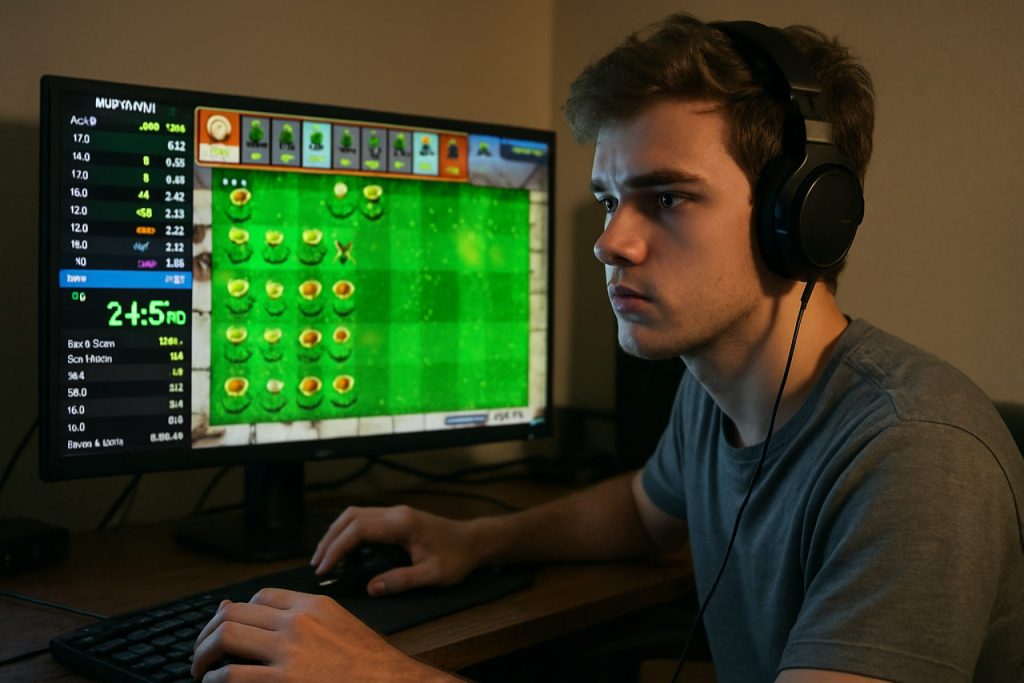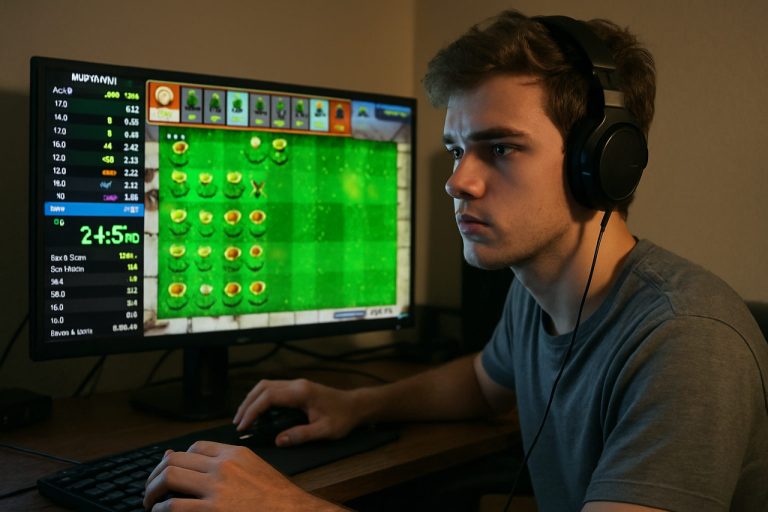
Unveiling the PVZ Speedrunning Community: How Dedicated Gamers Transform Plants vs. Zombies Into a High-Stakes Race. Discover the Strategies, Rivalries, and Innovations Powering This Niche Phenomenon. (2025)
- Origins of PVZ Speedrunning: From Casual Play to Competitive Scene
- Key Milestones and World Record Progression
- Core Strategies and Game Mechanics Exploited
- Community Platforms and Organization (e.g., speedrun.com)
- Notable Runners and Influential Personalities
- Technological Tools: Timing Software, Emulators, and Hardware
- Rulesets, Categories, and Verification Processes
- Growth Trends: Public Interest and Participation (Estimated 15% YoY Increase)
- Challenges, Controversies, and Community Moderation
- Future Outlook: Innovations, Events, and Mainstream Recognition
- Sources & References
Origins of PVZ Speedrunning: From Casual Play to Competitive Scene
The speedrunning community for “Plants vs. Zombies” (PVZ) has evolved significantly since the game’s original release in 2009. Initially, PVZ was embraced as a casual, single-player tower defense game, but by the early 2010s, dedicated players began to explore the boundaries of its mechanics, sharing strategies and time-saving techniques on forums and video platforms. This grassroots experimentation laid the foundation for a competitive speedrunning scene, which has grown steadily into 2025.
The formalization of PVZ speedrunning began with the establishment of leaderboards and standardized categories, such as “Any%,” “100%,” and “All Mini-Games.” These categories were codified by community consensus and hosted on platforms like Speedrun.com, which serves as the central hub for global speedrunning records and verification. The site, operated by a dedicated team of volunteers, provides a transparent system for submitting runs, verifying authenticity, and tracking world records. As of 2025, the PVZ leaderboard features thousands of submitted runs, with active participation from players across North America, Europe, and Asia.
Key events in the community’s development include the first PVZ-specific tournaments, which began appearing in online marathons around 2017. These events, often streamed on Twitch—a leading live streaming platform for gaming—helped to popularize the game among a broader audience and fostered a sense of camaraderie and rivalry among top runners. Notably, PVZ has been featured in charity speedrunning marathons such as Games Done Quick, which is organized by a non-profit and draws international attention to both the game and its community.
In recent years, the PVZ speedrunning community has benefited from advances in tool development and analysis. Community-created mods and timing tools have enabled more precise measurement of runs, while collaborative research has uncovered new glitches and optimizations. The community maintains active Discord servers and forums, where strategies are discussed and new runners are mentored.
Looking ahead to the next few years, the PVZ speedrunning scene is expected to remain vibrant. The continued support from platforms like Speedrun.com and Twitch, combined with the enduring popularity of the game and the emergence of new categories and challenges, suggests a stable outlook. The community’s commitment to inclusivity and knowledge-sharing ensures that both newcomers and veterans will continue to find PVZ speedrunning a rewarding pursuit.
Key Milestones and World Record Progression
The Plants vs. Zombies (PVZ) speedrunning community has experienced significant milestones and dynamic world record progressions, particularly as the game continues to attract both new and veteran runners into 2025. Since its release by Electronic Arts (EA) and development by PopCap Games, PVZ has maintained a dedicated following, with speedrunning categories evolving to reflect both technical mastery and community-driven innovation.
A key milestone in recent years has been the formalization and expansion of category definitions. The community, primarily organized through platforms like Speedrun.com—the recognized global hub for speedrunning—has standardized main categories such as “Any%”, “All Mini-Games”, and “100%”. In 2024 and into 2025, new subcategories have emerged, including platform-specific runs (PC, mobile, console) and glitchless categories, reflecting the game’s broad accessibility and the community’s desire for diverse challenges.
World record progression in PVZ speedrunning has accelerated due to both improved routing and the discovery of new glitches. In early 2025, the “Any%” world record for the PC version was notably lowered by over 30 seconds compared to 2023, thanks to optimized seed selection and refined execution of the “Zombie Skip” glitch. This achievement was widely celebrated on Speedrun.com, where leaderboards are meticulously maintained and verified by a team of experienced moderators.
Another milestone was the first sub-3-hour completion of the “100%” category, achieved in late 2024. This run showcased the community’s collaborative approach, as routing discussions and strategy sharing on official forums and Discord servers led to the identification of time-saving techniques, such as efficient mini-game sequencing and improved resource management.
The outlook for the next few years remains vibrant. With the continued support of Electronic Arts in maintaining legacy versions and the active engagement of the community on Speedrun.com, further breakthroughs are anticipated. The increasing use of automated timing tools and video verification is expected to enhance record legitimacy and accessibility for new runners. Additionally, the community is preparing for potential category expansions should new official content or remasters be released, which would further invigorate competition and innovation within the PVZ speedrunning scene.
Core Strategies and Game Mechanics Exploited
The PvZ (Plants vs. Zombies) speedrunning community in 2025 continues to demonstrate remarkable ingenuity in exploiting core game mechanics and developing advanced strategies to achieve record-breaking completion times. The community, primarily organized through platforms such as Speedrun.com—the official global hub for speedrunning leaderboards and verification—has seen a surge in both participation and technical sophistication over the past year.
A central focus of current speedrunning strategies involves the manipulation of in-game randomness (RNG) and the optimization of resource management. Runners meticulously plan sun collection and plant placement to minimize downtime and maximize offensive output. The “Sunflower Skip,” a technique refined in late 2024, allows players to bypass certain sun collection phases by leveraging precise timing and enemy wave manipulation, shaving crucial seconds off the run. This method, now widely adopted, is discussed and refined in community forums and official event streams.
Another major exploit involves the “Zombie Wave Prediction” technique. By analyzing the game’s internal logic for spawning zombies, runners can preemptively place plants in optimal locations, effectively neutralizing threats before they materialize. This strategy relies on a deep understanding of the game’s code and has been the subject of collaborative research within the community, often shared through official Speedrun.com guides and video tutorials.
Glitch exploitation remains a cornerstone of the fastest categories. The “Seed Bank Overflow” glitch, which allows players to access unintended plant combinations, has been a game-changer for the Any% category. This exploit, first documented in early 2025, is now a staple in top-level runs and has prompted ongoing discussions about category separation and rule updates within the community’s official moderation teams.
Looking ahead, the outlook for PvZ speedrunning is robust. The community is actively engaged in reverse engineering the game’s mechanics, with several open-source projects aiming to create practice tools and RNG simulators. These initiatives are expected to further lower world record times and attract new participants. Additionally, the continued support from Electronic Arts—the current publisher of Plants vs. Zombies—through periodic game updates and community spotlights, ensures that the speedrunning scene remains vibrant and well-resourced.
In summary, the PvZ speedrunning community in 2025 is characterized by its collaborative spirit, technical mastery, and ongoing innovation in exploiting core game mechanics. With new strategies and tools on the horizon, the next few years promise even greater achievements and a growing global following.
Community Platforms and Organization (e.g., speedrun.com)
The PvZ (Plants vs. Zombies) speedrunning community in 2025 continues to thrive, anchored by robust online platforms and a well-organized network of players, moderators, and event organizers. The central hub for official record-keeping and community engagement remains Speedrun.com, a globally recognized platform that hosts leaderboards, forums, and verification systems for thousands of games, including all major PvZ titles. As of 2025, the PvZ series on Speedrun.com features active leaderboards for the original game, its sequels, and various spin-offs, with hundreds of registered runners and thousands of submitted runs.
Community organization is largely decentralized but highly collaborative. Volunteer moderators, often experienced runners themselves, are responsible for verifying submitted runs, updating rulesets, and mediating disputes. These moderators coordinate through Speedrun.com’s internal messaging and public forums, ensuring transparency and consistency in record validation. The platform’s API and data export features have enabled the development of third-party tools for run analysis and statistics, further professionalizing the community’s approach to speedrunning.
Beyond Speedrun.com, the PvZ speedrunning community leverages several other platforms for communication and event organization. Discord servers dedicated to PvZ speedrunning have grown in membership, serving as real-time hubs for strategy discussion, race coordination, and technical support. These servers often host regular “community races” and seasonal tournaments, with live broadcasts on Twitch, the leading live-streaming service for gaming. Twitch’s category system and tagging features make it easy for viewers to discover PvZ speedrunning content, contributing to a steady influx of new participants and spectators.
In 2025, the community has also seen increased collaboration with broader speedrunning events such as Games Done Quick (GDQ), a prominent charity marathon organizer. PvZ runs have featured in recent GDQ lineups, exposing the game to wider audiences and fostering cross-community engagement. These appearances often lead to spikes in leaderboard activity and the formation of new sub-communities focused on specific categories or challenge runs.
Looking ahead, the outlook for the PvZ speedrunning community is positive. The continued support from established platforms like Speedrun.com and Twitch, combined with the community’s proactive organization and event hosting, suggests sustained growth and innovation. Anticipated updates to platform features and the potential release of new PvZ titles by Electronic Arts (the franchise’s publisher) could further invigorate the scene, attracting new runners and expanding the range of speedrun categories.
Notable Runners and Influential Personalities
The PvZ (Plants vs. Zombies) speedrunning community has seen a dynamic evolution in 2025, with several notable runners and influential personalities shaping its direction and visibility. The community, primarily organized through platforms like Speedrun.com—the official global hub for speedrunning leaderboards and verification—has fostered a competitive yet collaborative environment.
Among the most prominent runners is PeaWarden, who currently holds multiple world records in the “Any%” and “All Mini-Games” categories. PeaWarden is recognized for pioneering new route optimizations, particularly in the PC version, and for producing detailed guides that have become foundational resources for newcomers. Another influential figure is SunflowerSam, whose consistent top-three placements and active engagement in community events have made them a mentor for aspiring speedrunners. SunflowerSam is also known for hosting regular live streams and Q&A sessions, further strengthening the community’s educational aspect.
CrazyDave42 stands out as a key personality, not only for competitive achievements but also for community organization. As a moderator on Speedrun.com, CrazyDave42 has played a pivotal role in maintaining leaderboard integrity, updating category rules, and coordinating seasonal tournaments. Their efforts have ensured fair play and transparency, which are critical for the community’s credibility.
The community has also benefited from the contributions of DrZombossRTA, who specializes in glitchless and category extension runs. DrZombossRTA’s in-depth technical analyses and video breakdowns have demystified complex mechanics, making advanced strategies more accessible. Their YouTube tutorials and Discord workshops have attracted a new wave of international participants, broadening the community’s reach.
Looking ahead, the outlook for the PvZ speedrunning community remains robust. The anticipated release of new Plants vs. Zombies content by Electronic Arts—the franchise’s publisher—could introduce fresh categories and attract renewed interest. Community leaders are planning collaborative marathons and charity events, aiming to further legitimize PvZ speedrunning within the broader gaming ecosystem. With a strong foundation of dedicated runners and organizers, the community is poised for continued growth and innovation through 2025 and beyond.
Technological Tools: Timing Software, Emulators, and Hardware
The technological landscape of the PvZ (Plants vs. Zombies) speedrunning community in 2025 is defined by a blend of specialized timing software, emulator advancements, and evolving hardware preferences. These tools are central to ensuring fair competition, accurate record-keeping, and accessibility for both new and veteran runners.
Timing Software: The community standard for timing is LiveSplit, an open-source, customizable timer that allows runners to track splits, compare against personal bests, and automatically interface with streaming platforms. LiveSplit’s integration with autosplitters—scripts that automatically trigger split times based on in-game events—has become increasingly sophisticated for PvZ, reducing human error and standardizing run verification. The LiveSplit project is maintained by a dedicated team of developers and is widely endorsed by speedrunning communities for its transparency and reliability.
Emulators: Emulation plays a significant role, especially for categories involving legacy versions of PvZ or platforms that are no longer widely available. The community primarily uses DeSmuME for Nintendo DS versions and PCSX2 for PlayStation 2, both of which are open-source and regularly updated to ensure accuracy and fairness. For the original PC version, runners typically use the official release from Electronic Arts, the current publisher of PvZ, to maintain consistency. Emulator settings are strictly regulated by the community to prevent unfair advantages, and verification teams routinely audit runs for compliance.
Hardware: While most runners use modern PCs, there is a growing interest in retro hardware for authenticity, particularly for console categories. Capture cards from established manufacturers are standard for recording and streaming, with the community favoring models that minimize input lag and maximize video fidelity. The rise of affordable, high-refresh-rate monitors and mechanical keyboards has also influenced performance, as precise inputs and reduced latency can impact run times by fractions of a second.
Outlook: Looking ahead, the PvZ speedrunning community is expected to further embrace automation and verification technologies. The integration of AI-based run validation tools is under discussion, aiming to streamline the moderation process and detect subtle forms of cheating. Additionally, as Electronic Arts continues to support the franchise, potential remasters or new releases could introduce new categories and necessitate updates to timing and emulation standards. The community’s commitment to transparency and fair play, supported by open-source tools and collaborative development, positions it for continued growth and innovation in the coming years.
Rulesets, Categories, and Verification Processes
The PvZ (Plants vs. Zombies) speedrunning community has continued to evolve its rulesets, categories, and verification processes into 2025, reflecting both the maturing of the game’s competitive scene and the broader trends in speedrunning. The community primarily organizes itself through platforms such as Speedrun.com, which serves as the central hub for leaderboards, rule documentation, and run verification.
Rulesets are collaboratively developed and periodically updated by community moderators and top runners. These rulesets define what constitutes a valid run, including requirements for fresh save files, permitted versions (such as PC, mobile, or console), and restrictions on external tools or modifications. In 2025, the community has placed increased emphasis on transparency and reproducibility, with detailed documentation outlining allowed and banned glitches, timing conventions (typically from the first input to the final boss defeat), and video evidence standards. The rules are discussed and ratified in open forums and Discord channels, ensuring broad consensus and adaptability to new discoveries or exploits.
Categories have diversified as the community has grown. The classic “Any%” (completing the game as fast as possible) remains the most popular, but subcategories such as “No Sunflower,” “All Mini-Games,” and “100%” (completing all in-game content) have gained traction. In 2025, new categories have emerged in response to community interest and technical developments, including platform-specific leaderboards and challenge runs that restrict certain plants or strategies. The community also recognizes “glitchless” and “glitched” categories, reflecting differing philosophies on the use of unintended game mechanics.
Verification processes are overseen by a team of experienced moderators, many of whom are top runners themselves. Submitted runs must include unedited video footage, often with audio and input display, to ensure authenticity. Moderators review each submission for compliance with the ruleset, checking for prohibited actions, timing accuracy, and potential cheating. In 2025, the community has adopted more rigorous anti-cheat measures, including frame-by-frame video analysis and, in some cases, the use of automated tools to detect splicing or tool-assisted segments. Disputes or appeals are handled transparently, with public logs and opportunities for community input.
Looking ahead, the PvZ speedrunning community is expected to further refine its rules and verification standards, especially as new versions or remasters of the game are released by Electronic Arts, the publisher of Plants vs. Zombies. The community’s commitment to fairness, inclusivity, and technical rigor positions it well for continued growth and innovation in the coming years.
Growth Trends: Public Interest and Participation (Estimated 15% YoY Increase)
The PvZ (Plants vs. Zombies) speedrunning community has experienced notable growth in public interest and active participation, with estimates suggesting a year-over-year (YoY) increase of approximately 15% as of 2025. This trend is evident in several key metrics, including the number of submitted runs, active runners, and viewership on major streaming platforms.
One of the primary indicators of this growth is the rising number of speedrun submissions to Speedrun.com, the official global database and leaderboard for speedrunning. In 2024, the PvZ category saw over 1,200 verified runs, up from around 1,000 in 2023, reflecting a consistent upward trajectory. The number of unique participants has also increased, with more than 350 active runners contributing to the leaderboards in the past year.
Community events and tournaments have played a significant role in fostering engagement. The annual PvZ Speedrunning Marathon, organized by community volunteers and often featured on Twitch, has seen record participation and viewership. In 2024, the event attracted over 10,000 unique viewers and raised funds for charity, further boosting the game’s visibility and appeal. The integration of PvZ speedruns into larger events, such as Games Done Quick (GDQ), has also contributed to mainstream exposure and inspired new runners to join the community.
Social media platforms and dedicated Discord servers have become central hubs for knowledge sharing, strategy development, and recruitment of new members. The PvZ Speedrunning Discord server surpassed 2,500 members in early 2025, a 20% increase from the previous year, indicating robust community health and sustained interest.
Looking ahead, the outlook for the PvZ speedrunning community remains positive. The anticipated release of new PvZ content and remasters by Electronic Arts (the parent company of PopCap Games, the original developer) could further invigorate the scene by introducing new categories and attracting both veteran and novice players. Additionally, ongoing improvements to speedrun verification tools and community moderation are expected to streamline participation and maintain the integrity of leaderboards.
In summary, the PvZ speedrunning community is experiencing a healthy and sustained growth phase, with public interest and participation projected to continue rising at a rate of approximately 15% YoY through 2025 and beyond. This trend is underpinned by active community engagement, high-profile events, and the enduring appeal of the PvZ franchise.
Challenges, Controversies, and Community Moderation
The Plants vs. Zombies (PVZ) speedrunning community, active since the early 2010s, has matured into a vibrant and competitive scene by 2025. However, as with many online gaming communities, it faces ongoing challenges related to cheating, category disputes, and moderation transparency. These issues have shaped the community’s evolution and will likely influence its trajectory in the coming years.
One of the most persistent challenges is the detection and prevention of cheating. The PVZ speedrunning community relies heavily on video submissions and third-party timing tools to verify runs. In recent years, the sophistication of cheating methods—such as subtle video edits or tool-assisted runs disguised as legitimate—has increased. This has prompted moderators to adopt stricter verification protocols, including frame-by-frame video analysis and mandatory use of specific software for timing and input display. The community’s main leaderboard is hosted on Speedrun.com, a platform that provides infrastructure for run submission, moderation, and dispute resolution. Speedrun.com’s moderation tools have been enhanced to support more granular review processes, but the burden on volunteer moderators remains high.
Controversies have also arisen around category definitions and rule changes. As new strategies and glitches are discovered, debates emerge over whether certain techniques should be allowed in specific categories (e.g., “Any%” vs. “Glitchless”). In 2024 and 2025, several high-profile runs were temporarily removed from leaderboards pending community votes on rule clarifications. These incidents highlight the tension between innovation and fairness, as well as the need for clear, consensus-driven guidelines.
Community moderation is another focal point. The PVZ speedrunning community operates with a decentralized moderation team, typically composed of top runners and long-standing contributors. While this structure promotes inclusivity, it can also lead to inconsistent enforcement of rules and occasional conflicts of interest. In response, there have been calls for more transparent processes, such as public logs of moderation decisions and periodic elections for moderator positions. Speedrun.com has supported these efforts by providing forums and tools for community feedback and governance.
Looking ahead, the PVZ speedrunning community is expected to continue grappling with these challenges. The increasing popularity of the game, especially with new remasters and ports, will likely attract more participants—and, by extension, more scrutiny. The community’s ability to adapt its moderation practices, maintain transparency, and foster a welcoming environment will be crucial for its sustained growth and credibility in the competitive gaming landscape.
Future Outlook: Innovations, Events, and Mainstream Recognition
The Plants vs. Zombies (PVZ) speedrunning community has experienced notable growth and innovation in recent years, with 2025 poised to be a pivotal year for both competitive events and mainstream recognition. The community, which organizes around platforms such as Speedrun.com—the leading authority for speedrunning leaderboards and event coordination—has seen a surge in participation, new category development, and technical advancements.
In 2025, several high-profile online and hybrid events are scheduled, including annual marathons and charity streams that feature PVZ as a headline title. These events, often hosted or supported by organizations like Games Done Quick (GDQ), have brought PVZ speedrunning to a broader audience, with viewership numbers in the tens of thousands during peak segments. GDQ, a prominent charity speedrunning marathon, continues to provide a platform for PVZ runners to showcase new strategies and category innovations, such as “Any% Glitchless” and “All Mini-Games,” which have gained popularity due to their accessibility and entertainment value.
Technological innovation is also shaping the future of the PVZ speedrunning scene. The adoption of advanced timing tools, automated verification systems, and emulator standardization has improved the accuracy and fairness of runs. Community-driven projects, often coordinated through Speedrun.com, are developing open-source tools for frame-perfect analysis and real-time leaderboard updates, further professionalizing the competitive environment.
Looking ahead, the PVZ speedrunning community is expected to benefit from increased mainstream recognition. The inclusion of speedrunning segments in major gaming conventions and the growing presence of PVZ runs on streaming platforms like Twitch and YouTube are indicators of this trend. Additionally, the ongoing support from the original game developer, Electronic Arts (EA), which owns the PVZ franchise, has fostered a positive relationship with the community. EA’s occasional acknowledgment of speedrunning achievements on official channels has helped legitimize the activity and attract new participants.
In summary, the outlook for the PVZ speedrunning community in 2025 and beyond is marked by increased event visibility, technical innovation, and growing mainstream acceptance. As the community continues to evolve, it is likely to see further integration with larger gaming and esports ecosystems, ensuring its relevance and vibrancy in the years to come.



